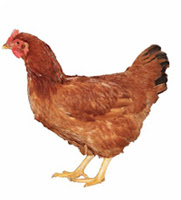Botulism: Causes And Preventive Measures
Botulism is a disease characterised by paralysis of the neck and limbs of poultry. Usually, a number of birds are affected and they quickly succumb. It can attack all domestic poultry including fowls, turkeys, water fowl, pheasants, emus and most wild birds. Carrion-eating birds can withstand large doses of the toxin without showing any symptoms. It is otherwise known as Limberneck and scientifically referred to as Clostridium botulinum.
Causes
* It is mainly caused by ingestion of a toxin produced by Clostridium botulinum; a bacterium in decaying animal and vegetable matter.
* Botulism occurs sporadically in poultry raised under conditions where hygiene is poor and birds have access to contaminated material.
* Wild birds may contaminate domestic poultry feed or water supplies which, when ingested, may lead to infection or disease.
Symptoms
Symptoms of botulism start to appear 12 to 48 hours after the toxin has been ingested. The symptoms are as follow:
* Affected birds will first appear weak, drowsy and reluctant to move.
* The bird's head will droop, later resting it on the ground, with their eyes closed and wings drooped.
* They may then lapse into a coma and die.
* Their neck may be coiled over or lie straight on the ground due to flaccid paralysis.
* Feathers may be plucked easily.
Treatment
1. When birds eat spoiled food, flush the flock with Epsom salts (1 lb. per 1000 hens) in water or wet mash.
2. It has been reported that potassium permanganate in drinking water, in a ratio of one part potassium permanganate to 3000 parts water, can counteract botulism.
3. Affected birds can be treated with botulism antibiotic and/or antitoxin injections, if available.
Control Measures
Botulism is best prevented by:
* removing dead birds daily.
* removing the source of the toxin.
* supplying clean feed and water.
* keeping birds away from stagnant or pooled water, if your birds are on free range system.
* providing feed in containers and not on the ground.
* isolating the sick birds and providing feed and water.
* providing supportive therapy with antibiotics and vitamins has been helpful in some cases as the birds that live through 48 hours of illness usually recover.
For quick updates and comments, follow us on our social media connects; FacebookPage, TwitterHandle and Instagram. You can also subscribe and watch videos on our YouTube channel. At Artib Farm, we materialize your satisfaction!
Cited Works
1.) Poultry Botulism - https://www.business.qld.gov.au, retrieved on 22nd December, 2018.
2.) Botulism In Poultry - https://articles.extension.org, retrieved on 12th December, 2018.





Comments
Post a Comment